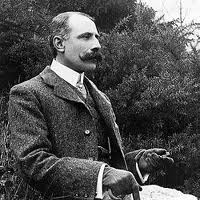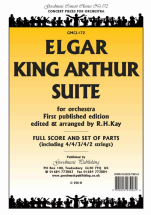King Arthur Suite
Buy this item (out of stock)
Product ID: GM1 CL172
By Edward Elgar
Publisher:
Goodmusic
Arranger:
Kay
Series:
Concert Classics
Genre:
Romantic Era
Line Up:
Symphony Orchestra
Duration:
21:00
Level: 4
Set & Score
This item is out of stock
About this item
Elgar's incidental music to Laurence Binyon's play Arthur was written in 1923. It was scored for a theatre orchestra of 13 players, and Elgar never rescored it for full orchestra - consequently it has remained unpublished and unknown. This new performing edition has been prepared by Robert Kay. It is made up of selections from the Arthur music rescored for standard symphony orchestra, and incorporates the majority of the music.
The plot of the play is as follows. Sir Lancelot is the secret lover of Guinevere, King Arthur's queen. The play opens with Lancelot, wounded in battle, having been nursed back to health by Elaine (daughter of the courtier Sir Bernard). Elaine loves Lancelot but is rejectedby him and subsequently dies of a broken heart. Meanwhile the usurper Mordred, Arthur's nephew, has uncovered the relationship between Lancelot and Guinevere, and reveals this to Arthur with the intention of turning Arthur against Lancelot and thereby weakening Arthur's hold on power. Lancelot flees to his castle in the north, where he is besieged by Arthur's followers. Lancelot is banished, Guinevere leaves Arthur and enters a nunnery, while Arthur, having killed Mordred in battle, himself dies, his body being transported to the Isle of Avalon.
The six movements are:- King Arthur and Sir Lancelot; Elaine; Banqueting Scene; The Castle at Night; Battle Scene; The Death of Arthur.
Instrumentation
Piccolo, 2 Flutes, 2 Oboes, 2 Clarinets in Bb, 2 Bassoons, 4 Horns in F, 2 Trumpets in Bb, 3 Trombones, Tuba, Timpani, Percussion (Side drum, Cymbals, Bass drum, Triangle, Tambourine, Gong, Tubular Bell), Harp Strings (Violin 1, Violin 2, Viola, Cell
Reviews and rating
No review available, be the first to write one!

Composer
Edward Elgar (1857-1934)

Sir Edward William Elgar, 1st Baronet OM, GCVO (2 June 1857 – 23 February 1934) was an English composer, many of whose works have entered the British and international classical concert repertoire. Among his best-known compositions are orchestral works including the Enigma Variations, the Pomp and Circumstance Marches, concertos for violin and cello, and two symphonies. He also composed choral works, including The Dream of Gerontius, chamber music and songs. He was appointed Master of the King's Musick in 1924.
Although Elgar is often regarded as a typically English composer, most of his musical influences were not from England but from continental Europe. He felt himself to be an outsider, not only musically, but socially. In musical circles dominated by academics, he was a self-taught composer; in Protestant Britain, his Roman Catholicism was regarded with suspicion in some quarters; and in the class-conscious society of Victorian and Edwardian Britain, he was acutely sensitive about his humble origins even after he achieved recognition. He nevertheless married the daughter of a senior British army officer. She inspired him both musically and socially, but he struggled to achieve success until his forties, when after a series of moderately successful works his Enigma Variations (1899) became immediately popular in Britain and overseas. He followed the Variations with a choral work, The Dream of Gerontius (1900), based on a Roman Catholic text that caused some disquiet in the Anglican establishment in Britain, but it became, and has remained, a core repertory work in Britain and elsewhere. His later full-length religious choral works were well received but have not entered the regular repertory. The first of his Pomp and Circumstance Marches (1901) is well known in the English-speaking world.
In his fifties, Elgar composed a symphony and a violin concerto that were immensely successful. His second symphony and his cello concerto did not gain immediate public popularity and took many years to achieve a regular place in the concert repertory of British orchestras. Elgar's music came, in his later years, to be seen as appealing chiefly to British audiences. His stock remained low for a generation after his death. It began to revive significantly in the 1960s, helped by new recordings of his works. Some of his works have, in recent years, been taken up again internationally, but the music remains more played in Britain than elsewhere.
Elgar has been described as the first composer to take the gramophone seriously. Between 1914 and 1925, he conducted a series of recordings of his works. The introduction of the microphone in 1925 made far more accurate sound reproduction possible, and Elgar made new recordings of most of his major orchestral works and excerpts from The Dream of Gerontius. These recordings were reissued on LP record in the 1970s and on CD in the 1990s.
More info about the composer...



 Click above to view samples
Click above to view samples
